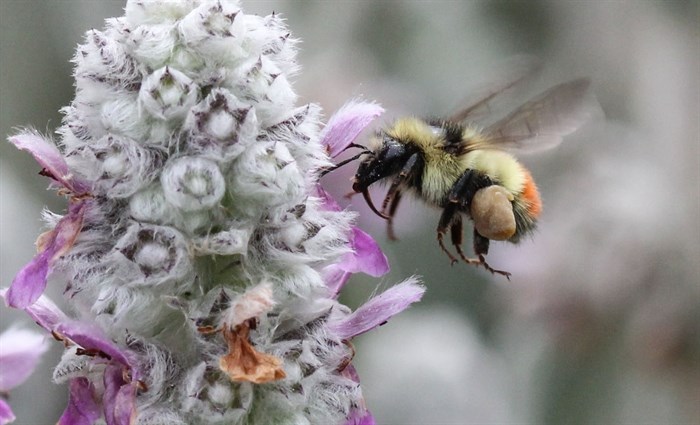
Image Credit: SUBMITTED/UBCO
August 02, 2021 - 3:30 PM
Humans aren’t the only creatures being impacted by smoky skies and warming temperatures — insects may be adapting behaviours to the weather too.
“One specific issue that we have been discussing in my lab is the fact that insects orient and find food, mates, and habitat through sight and smell and that wildfire smoke can potentially interfere with those really important insect behaviours,” Juli Carrillo, UBC professor with the Faculty of Land and Food Systems, said via email.
A special air quality advisory is in place for much of B.C.'s Interior due to wildfire smoke. A heat warning is also in effect.
READ MORE: Doctors, lawyers want B.C. to track injuries after record heat wave
It may be harder for pests to find their host plants in smoky and polluted environments because “the volatile compounds” or smell of their host plants, are masked by the smoke.
For pollinators, the visual cues they use to find flowers may be masked by a smoke cover so this may mean foraging is harder for them at larger distances when it’s smoky and polluted, she said.
After a fire has burned through an area, there may be fewer flowers available for pollinators and for other insects that rely on nectar and pollen.
“For example, parasitoid wasps, predaceous wasps, ladybugs, etc., all use floral resources for supplemental food when they are not eating pest insects and in the immediate aftermath of a fire, these resources will likely be patchy and harder to find,” she said.
After a wildfire, however, floral density can be quite high and habitat for these insects can increase, she said.
The Okanagan Bug Guy, Stuart Brown, said he hasn’t noticed as many butterflies this year and not as much nocturnal life, but as far as more opportunistic species like the boxelder beetle, “they're probably looking for food I would say, that’s probably why you’re seeing more than usual."
The heat and smoke could be driving the insects indoors. In Enderby, he hasn’t noticed any ants outdoors on their hills in the day but in the nights they’re all over the place.
READ MORE: B.C. readies response ahead of second heat wave expected this weekend
“They’re almost adopting a more nocturnal behaviour,” he said, adding that it is species dependent but most ants are active in the day.
John Richardson, UBC professor in the Department of Forest and Conservation Sciences said it is possible for ants and other species to change their behaviours due to heat.
“Most animals will avoid temperatures that are too hot (or too cold) and if they have to change the time of day of their activities they will,” he said via email, but added there are limits to how a species may shift its active hours as they may need a specific amount of light, nectar, or need to find prey that is active only during the day.
To contact a reporter for this story, email Carli Berry or call 250-864-7494 or email the editor. You can also submit photos, videos or news tips to the newsroom and be entered to win a monthly prize draw.
We welcome your comments and opinions on our stories but play nice. We won't censor or delete comments unless they contain off-topic statements or links, unnecessary vulgarity, false facts, spam or obviously fake profiles. If you have any concerns about what you see in comments, email the editor in the link above.
News from © iNFOnews, 2021